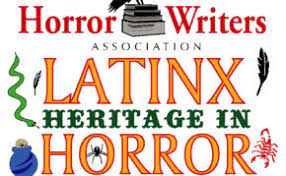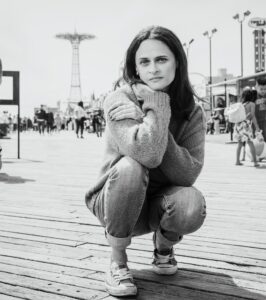

Born and raised in New York City, Luisa began her career as a journalist in the late 90s; her work has appeared in numerous print and online publications such as New York, Latina, USA Today, The New York Times, and many more. Her other creative work includes illustration and two murals currently displayed at the World Trade Center. Inspired by her fascination with the cinema, Luisa also made a brief but successful foray into acting, starring in the award-winning 2006 indie film Day Night Day Night as well as the titular role in Alejandro González Iñárritu’s 2007 short film Anna.
What inspired you to start writing?
I started writing when I was really young. It was an instinct about how I wanted to express myself, probably at least in part because I started reading at a very early age. I think even then I had stories to tell that were a combination of feelings, experience, and curiosity—similar to now! Drawing was my first method of storytelling and then I quickly added words into the mix. I still like to draw comics, but primarily I tell stories through writing. It’s the way I express myself best. It’s my favorite medium just like choosing to work with clay over oil paint.
What was it about the horror genre that drew you to it?
Horror can be really thrilling and exhilarating, but what I love most about it is the ultimate freedom it gives you to create as well as to understand. I can explore ideas and tell stories without any limits. I can interpret other work in a way that helps me understand those writers and at the same time learn about what my own perceptions might mean. It’s a fascinating hall of mirrors. And horror allows ideas to manifest in their most unconscious form, kind of like the way things are represented in dreams. It’s a very primal expression—a release, like a scream. Horror might be an upside-down world but to me, it’s home.
Do you make a conscious effort to include LatinX characters and themes in your writing and if so, what do you want to portray?
Yes. I like to write what I know as much as possible, so that’s part of it. My characters may be different from what some people imagine as being the norm in the LatinX community, and that’s the other part of it. There’s no one way for any community to look. Some readers might find my characters familiar and others might be surprised. I like both of those ideas—the familiarity is nice and if someone is surprised and thinks my characters stray from their existing concept of “LatinX,” I think that’s great, too.
What has writing horror taught you about the world and yourself?
Writing horror has really brought me to a place of peace and acceptance of myself that I’ve never had before. There is a tendency for a lot of people to suppress pain, dark thoughts, and traumatic experiences, both in themselves and in others. “Try not to dwell on it,” “Don’t be so morbid,” “Why do you want to put depressing stuff out into the world?” I’ve heard it all, and it all boils down to “Don’t be yourself because being yourself is the wrong way to be.” Talk about chronic invalidation! Now suddenly I feel like I have a place in this world where I belong, where it’s okay to be me—more than okay. And that has taught me something not just about myself but about the world around me.
How have you seen the horror genre change over the years? And how do you think it will continue to evolve?
The evolution of the horror genre makes me think of the saying “The more things change…” There have always been works of horror that were born out of authenticity, horror that’s geared towards commercialism, horror that works stuff out, and combinations of all of it. It never stops evolving, but there is something familiar about the genre, always. I think it’s because as humans we self-perpetuate a series of ideas—even within the context of new material—but also because horror creators are so sincerely inspired by those who came before them. There are those threads and references woven in here and there, both on purpose and unconsciously.
How do you feel the LatinX community has been represented thus far in the genre and what hopes do you have for representation in the genre going forward?
I think it’s amazing to see what the LatinX community is creating, but the culture and community are so boundless, multifaceted, and ever-evolving that there’s always room for more representation. Visibility—and what happens to creative work when it’s put out into the world—means different things for different people, but there should be space for all of it.
Who are some of your favorite LatinX horror authors and characters?
I have been so completely immersed in Bad Moon Rising and the (as-yet-untitled) follow-up, which I’m working on now, that I’ve got tunnel vision and am completely preoccupied with the LatinX quadfecta of horror and weirdness that makes up the Vendeval family in both books. I get really, really obsessive with my writing. It makes it hard for me to focus on anything else related. And of course that serves me and helps with my creative output. But it makes me a sort of boring conversationalist when it comes to other, current works. I’m kinda like, Oh, reading? Yeah, I’m reading… the new draft of my book. But of course, there is no shortage of amazing LatinX horror authors and their characters, and some great, authentically written round-ups online that can help people find them.
What is one piece of advice you would give horror authors today?
My advice to writers is always kind of the same, but I never get tired of saying it because I really believe it: write and find your people. Remember there’s nothing wrong with you for putting dark stuff out into the world, and if you get pushback, you have not found your people yet. For me, horror has to have meaning, it has to be something that’s getting worked out, and it has to have real-life roots. But I would not tell anyone else how or why to practice their craft—I would just say to make sure you actually do stuff. Obviously, nothing happens unless you write.
And to the LatinX writers out there who are just getting started, what advice would you give them?
Specifically for LatinX writers—I was asked recently what piece of advice I wish I had gotten when I started writing Bad Moon Rising, and I said I wish someone had looked me in the eyes and said “What you are doing is hard, but it matters. What you have to say is important. And it’s worth fighting for.” There’s a good chance no one will say it to you, so my advice is to say it to yourself and do your best to get to a place where you believe it.

